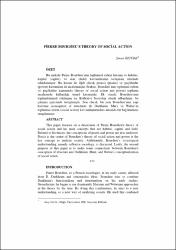Pierre Bourdieu’s Theory of Social Action
Özet
Bu makale Pierre Bourdieu’nun toplumsal eylem kuramı ve habitus,
kapital (capital) ve alan (field) kavramlarının tartışması üzerinde
odaklanmıştır. Bu kuram ile ilgili olarak praksis (praxis) ve güç/iktidar
(power) kavramları da incelenmiştir. Praksis, Bourdieu’nun toplumsal eylem
ve güç/iktidar kuramında (theory of social action and power) toplumu
incelemede kullandığı temel kavramdır. Ek olarak, Bourdieu’nun
toplumbilimsel yaklaşımı da, Reflexive Sosyoloji olarak adlandırılır, bu
çalışma içerisinde tartışılmıştır. Son olarak, bu yazı Bourdieu’nun yapı
kavramı (conception of structure) ile Durkheim, Marx ve Weber’in
toplumsal eylem (social action) kavramlaştırmaları arasında bir bağ kurmayı
amaçlamıştır. This paper focuses on a discussion of Pierre Bourdieu's theory of
social action and his main concepts that are habitus, capital and field.
Related to his theory, the conceptions of praxis and power are also analyzed.
Praxis is the center of Bourdieu’s theory of social action and power is the
key concept to analyze society. Additionally, Bourdieu’s sociological
understanding, namely reflexive sociology, is discussed. Lastly, the second
purpose of this paper is to make some connections between Bourdieu's
conception of structure and Durkheim, Marx, and Weber's conceptualization
of social action.
Cilt
6Sayı
2Bağlantı
http://hdl.handle.net/11630/3440Koleksiyonlar
- Cilt 6 : Sayı 2 [18]



















